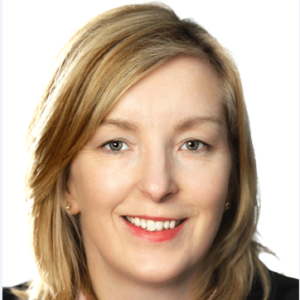 Elerina Conneely is the Group Financial Controller at Kerry Group. Based in the corporate head office in Tralee, Co. Kerry, Elerina’s role is a key finance leadership in the organisation, responsible for the performance measurement of the business, decision-making support, risk & control and transaction management. The role is responsible for the global financial control team that operates throughout all the locations in Kerry Group’s footprint. Kerry Group is a global company based out of Ireland and employs 24,000 people. It is the leader in taste & nutrition serving the food, beverage and pharmaceutical industries and also a leading supplier of value-added brands and customer branded foods to the Irish, UK and selected international markets.
Elerina Conneely is the Group Financial Controller at Kerry Group. Based in the corporate head office in Tralee, Co. Kerry, Elerina’s role is a key finance leadership in the organisation, responsible for the performance measurement of the business, decision-making support, risk & control and transaction management. The role is responsible for the global financial control team that operates throughout all the locations in Kerry Group’s footprint. Kerry Group is a global company based out of Ireland and employs 24,000 people. It is the leader in taste & nutrition serving the food, beverage and pharmaceutical industries and also a leading supplier of value-added brands and customer branded foods to the Irish, UK and selected international markets.
Elerina’s career started as a graduate in Kerry having completed a Bachelor of Commerce degree in NUIG. Following experiences at various locations in Kerry including Listowel, Aylesbury, UK and the corporate office in Tralee, Elerina spent approximately four years with her family at Kerry’s North America Head Office in Beloit, Wisconsin, USA as the CFO for that region. Elerina, her husband Barry and 11 year old daughter Cliona relocated back to Ireland in 2017. Her interests include travelling, skiing and spending time with her family.
Can leadership be taught? If so, how?
I believe all skills can be taught – some people may have it inherently and that does make it easier. However, starting with self-awareness, you then can assess what you need to make you a better leader. Then it is about finding the right environment to help you grow – that can be through the organisation you work for or by finding an inspirational mentor.
When you are filling a leadership role in your organisation what qualities do you look for from candidates?
Communication skills – being able to deliver a message clearly but also the ability to listen. Leaders know they don’t have all the answers but they have the sense to ask the right questions, listen to all the answers and determine the best way forward. As you start out your career, you need technical skills from your chosen field be it accountancy, engineering, HR skills, Marketing skills etc. As you grow in your career as a manager and to a leadership role, you need to develop communication skills and talent development skills – helping your team be the best they can be.
If you had to leave your organisation for 1 year what would you ask of your team and what advice would you give them?
-Believe in yourself. Sometimes, leadership is about confidence.
-Keep things simple. Trying not to overcomplicate things is key to finding solutions.
-Be clear what you need to achieve and keep track of those goals. It is easy to get distracted.
What are you doing today to make sure your organisation will be relevant in 10 years time?
Planning and talent development. Looking ahead and identifying where you need to go, what could possibly change so you can be ready for it and then developing the best team to get there.
What leaders outside your own organisation do you admire and why?
There are many great leaders but inspirational leaders are those that take a brave leap be that on a global or national context or on a personal context. Mary Robinson – not only the first female president of Ireland but a person who tackled really difficult topics especially human rights on a global level. Caroline McEnery – she believed in her own skills and leadership to leave an organisation that surrounded her with the support she needed to go it alone. Well done Caroline!
What are a few resources (books, blogs, podcasts, courses etc) you would recommend to someone looking to gain insight into becoming a better leader?
I do take time to look at TedTalks and read articles especially on LinkedIn – we have to keep learning and being open to ideas. Also, for me, Sheryl Sandberg’s book “Lean In” is a good read. She is encouraging women to “Lean in” at the table within organisations and to take risks. My favourite quote by her is “Women don’t take enough risks. Men are just ‘foot on the gas pedal.’ We’re not going to close the achievement gap until we close the ambition gap”.
